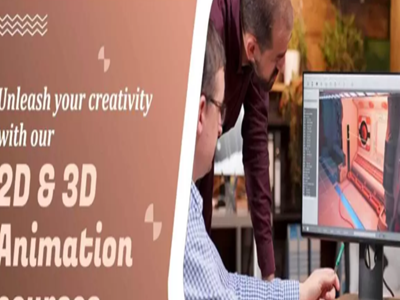What is 3d animation degree ?
A 3D Animation degree is an academic program that focuses on teaching students the skills and knowledge required to create three-dimensional animated content. This degree combines artistic creativity with technical expertise and typically covers various aspects of animation, design, and production.
Key Components of a 3D Animation Degree:
- Modeling: Creating 3D objects, characters, and environments using specialized software like Autodesk Maya, Blender, or 3ds Max.
- Rigging: Building skeletal structures to allow characters or objects to move realistically.
- Animation: Bringing models to life by animating their movements and interactions.
- Rendering: Generating the final visuals, including lighting, shading, and texturing.
- Visual Effects (VFX): Adding elements like explosions, smoke, water, and other dynamic effects.
- Storyboarding: Planning and sketching the sequence of events before animation production.
- Software Training: Learning to use industry-standard tools and technologies for animation and post-production.
- Team Collaboration: Working in groups to simulate real-world animation projects.
Career Opportunities:
Graduates with a 3D Animation degree can pursue careers in:
- Film and television production
- Video game design
- Virtual reality (VR) and augmented reality (AR)
- Advertising and marketing
- Architectural visualization
- Medical and scientific simulations
Advanatages of 3d animation degree:
A 3D Animation degree offers several advantages, especially for individuals passionate about creative industries, storytelling, and technology. Below are some key benefits:
1. Career Opportunities
- A 3D Animation degree opens doors to diverse industries, including film, television, video games, advertising, virtual reality (VR), augmented reality (AR), and architectural visualization.
- The demand for skilled animators continues to grow with advancements in technology.
2. Creative Expression
- It provides a platform to bring imaginative ideas to life by creating visually stunning and dynamic animated content.
- You can contribute to storytelling, character development, and world-building.
3. Skill Development
- You gain expertise in cutting-edge animation tools and software like Blender, Autodesk Maya, and Adobe After Effects.
- The degree enhances skills in modeling, texturing, rigging, lighting, rendering, and animation.
4. Technological Knowledge
- You learn about the latest advancements in animation technology, virtual production, motion capture, and visual effects (VFX).
- This knowledge keeps you competitive in a fast-evolving industry.
5. Collaboration and Teamwork
- Many programs emphasize working on group projects, simulating real-world production environments.
- You develop teamwork, communication, and problem-solving skills.
6. Portfolio Development
- Most programs require creating a professional portfolio or demo reel, showcasing your best work to potential employers.
- A strong portfolio enhances your employability and career prospects.
7. Global Opportunities
- The animation industry is global, with opportunities in major studios, independent projects, and freelance work across the world.
8. Versatility
- Skills learned in a 3D Animation degree can be applied to various fields, such as gaming, medical simulations, product design, and education.
- You can work as an animator, VFX artist, game designer, or even transition into technical roles like 3D modeling for engineering or scientific visualizations.
9. High Income Potential
- Skilled professionals in 3D animation are in demand, and competitive salaries are offered, especially in entertainment and gaming industries.
10. Personal Satisfaction
- Working in a field that combines creativity and technology can be deeply fulfilling for those passionate about storytelling and design.
Importance of 3d animation degree:
The importance of a 3D Animation degree lies in its ability to equip individuals with the skills, knowledge, and opportunities needed to succeed in the growing and competitive field of animation. Below are the key reasons why a 3D Animation degree is valuable:
1. Skill Development
- A structured degree program provides a comprehensive understanding of essential tools and techniques in 3D animation, such as modeling, texturing, rigging, and rendering.
- It ensures hands-on experience with industry-standard software like Blender, Maya, or 3ds Max.
2. Industry Readiness
- The curriculum is often designed to align with current industry trends, ensuring that graduates have relevant skills for the job market.
- Programs often include internships or real-world projects to simulate professional environments.
3. Portfolio Creation
- A strong portfolio or demo reel is crucial for entering the animation field, and a degree program typically helps students build one by working on diverse projects.
4. Diverse Career Opportunities
- A degree in 3D animation prepares students for careers in multiple industries, such as:
- Film and TV production
- Video games
- Advertising
- Virtual and augmented reality
- Architecture and product design
- Scientific simulations
5. Competitive Advantage
- Employers often prefer candidates with formal education in animation, as it demonstrates a solid foundation in the principles and technical aspects of the craft.
- A degree can give you an edge over self-taught animators by validating your skills and dedication.
6. Creative and Technical Balance
- 3D animation blends creativity and technology, and a degree helps students master both aspects.
- It provides training in storytelling, visual design, and technical problem-solving.
7. Networking Opportunities
- Degree programs often connect students with industry professionals, alumni, and peers, which can lead to internships, mentorships, and job opportunities.
- Attending workshops, events, and competitions during the program builds valuable industry connections.
8. Global Demand
- With advancements in technology and growing content consumption, 3D animators are in high demand worldwide.
- The degree prepares graduates for global career opportunities in a competitive field.
9. Professional Growth and Advancement
- A degree lays the foundation for specialization in advanced areas, such as visual effects (VFX), game design, or virtual production.
- It also opens pathways to leadership roles in animation studios or creative agencies.
10. Cultural and Creative Contribution
- Animators play a significant role in shaping popular culture through movies, games, and digital content.
- A degree fosters the ability to create impactful stories and visual experiences.


